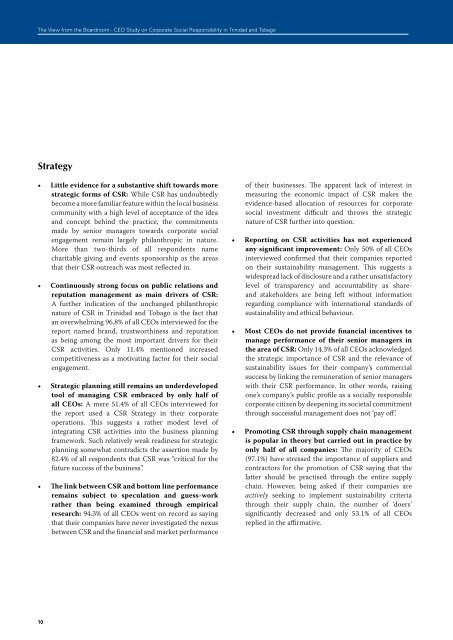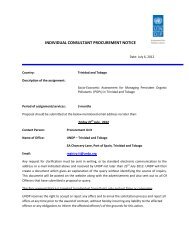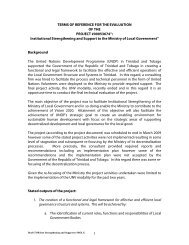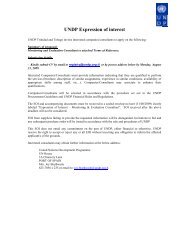The View from the Boardroom - UNDP Trinidad and Tobago
The View from the Boardroom - UNDP Trinidad and Tobago
The View from the Boardroom - UNDP Trinidad and Tobago
You also want an ePaper? Increase the reach of your titles
YUMPU automatically turns print PDFs into web optimized ePapers that Google loves.
<strong>The</strong> <strong>View</strong> <strong>from</strong> <strong>the</strong> <strong>Boardroom</strong> - CEO Study on Corporate Social Responsibility in <strong>Trinidad</strong> <strong>and</strong> <strong>Tobago</strong>Strategy• Little evidence for a substantive shift towards morestrategic forms of CSR: While CSR has undoubtedlybecome a more familiar feature within <strong>the</strong> local businesscommunity with a high level of acceptance of <strong>the</strong> idea<strong>and</strong> concept behind <strong>the</strong> practice, <strong>the</strong> commitmentsmade by senior managers towards corporate socialengagement remain largely philanthropic in nature.More than two-thirds of all respondents namecharitable giving <strong>and</strong> events sponsorship as <strong>the</strong> areasthat <strong>the</strong>ir CSR outreach was most reflected in.• Continuously strong focus on public relations <strong>and</strong>reputation management as main drivers of CSR:A fur<strong>the</strong>r indication of <strong>the</strong> unchanged philanthropicnature of CSR in <strong>Trinidad</strong> <strong>and</strong> <strong>Tobago</strong> is <strong>the</strong> fact thatan overwhelming 96.8% of all CEOs interviewed for <strong>the</strong>report named br<strong>and</strong>, trustworthiness <strong>and</strong> reputationas being among <strong>the</strong> most important drivers for <strong>the</strong>irCSR activities. Only 11.4% mentioned increasedcompetitiveness as a motivating factor for <strong>the</strong>ir socialengagement.• Strategic planning still remains an underdevelopedtool of managing CSR embraced by only half ofall CEOs: A mere 51.4% of all CEOs interviewed for<strong>the</strong> report used a CSR Strategy in <strong>the</strong>ir corporateoperations. This suggests a ra<strong>the</strong>r modest level ofintegrating CSR activities into <strong>the</strong> business planningframework. Such relatively weak readiness for strategicplanning somewhat contradicts <strong>the</strong> assertion made by82.4% of all respondents that CSR was “critical for <strong>the</strong>future success of <strong>the</strong> business”.• <strong>The</strong> link between CSR <strong>and</strong> bottom line performanceremains subject to speculation <strong>and</strong> guess-workra<strong>the</strong>r than being examined through empiricalresearch: 94.3% of all CEOs went on record as sayingthat <strong>the</strong>ir companies have never investigated <strong>the</strong> nexusbetween CSR <strong>and</strong> <strong>the</strong> financial <strong>and</strong> market performanceof <strong>the</strong>ir businesses. <strong>The</strong> apparent lack of interest inmeasuring <strong>the</strong> economic impact of CSR makes <strong>the</strong>evidence-based allocation of resources for corporatesocial investment difficult <strong>and</strong> throws <strong>the</strong> strategicnature of CSR fur<strong>the</strong>r into question.• Reporting on CSR activities has not experiencedany significant improvement: Only 50% of all CEOsinterviewed confirmed that <strong>the</strong>ir companies reportedon <strong>the</strong>ir sustainability management. This suggests awidespread lack of disclosure <strong>and</strong> a ra<strong>the</strong>r unsatisfactorylevel of transparency <strong>and</strong> accountability as share<strong>and</strong>stakeholders are being left without informationregarding compliance with international st<strong>and</strong>ards ofsustainability <strong>and</strong> ethical behaviour.• Most CEOs do not provide financial incentives tomanage performance of <strong>the</strong>ir senior managers in<strong>the</strong> area of CSR: Only 14.3% of all CEOs acknowledged<strong>the</strong> strategic importance of CSR <strong>and</strong> <strong>the</strong> relevance ofsustainability issues for <strong>the</strong>ir company’s commercialsuccess by linking <strong>the</strong> remuneration of senior managerswith <strong>the</strong>ir CSR performance. In o<strong>the</strong>r words, raisingone’s company’s public profile as a socially responsiblecorporate citizen by deepening its societal commitmentthrough successful management does not ‘pay off’.• Promoting CSR through supply chain managementis popular in <strong>the</strong>ory but carried out in practice byonly half of all companies: <strong>The</strong> majority of CEOs(97.1%) have stressed <strong>the</strong> importance of suppliers <strong>and</strong>contractors for <strong>the</strong> promotion of CSR saying that <strong>the</strong>latter should be practised through <strong>the</strong> entire supplychain. However, being asked if <strong>the</strong>ir companies areactively seeking to implement sustainability criteriathrough <strong>the</strong>ir supply chain, <strong>the</strong> number of ‘doers’significantly decreased <strong>and</strong> only 53.1% of all CEOsreplied in <strong>the</strong> affirmative.10
















